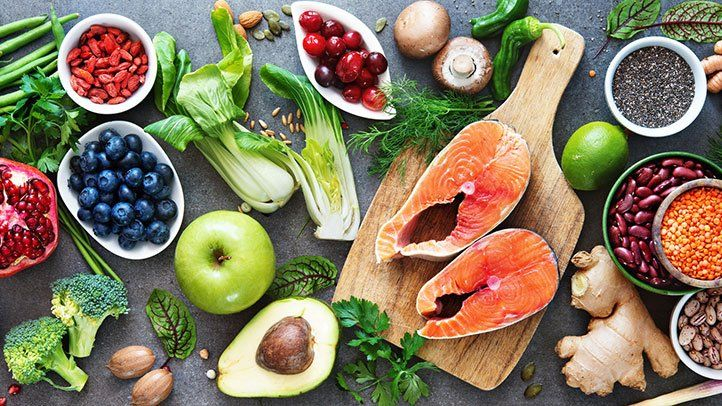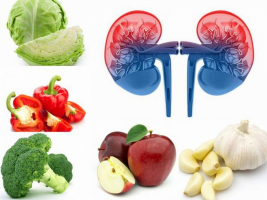Top 5 Best Diets for Heart Health
The main cause of death in the world is heart disease. Diet, along with other lifestyle choices like regular exercise and quitting smoking, is one of the best ... read more...methods to protect your heart. This is because your diet has an impact on your risk for heart disease, blood pressure, cholesterol, and other risk factors. While many diets make the claim to improve heart health, it's crucial to pick one that is supported by research and simple to follow over the long term. Below are the best diets for heart health!
-
The 1960s traditional eating habits of people in Greece and Southern Italy served as the foundation for the Mediterranean diet. The diet, in general, minimally processed foods, such as whole grains, nuts, seeds, fruits, vegetables, legumes, fish, and extra virgin olive oil. It also contains small amounts of red wine, dairy products with low fat, poultry, and eggs.
Additionally, it reduces or completely avoids red and processed meats, refined carbohydrates, and highly processed snacks. Numerous studies link the Mediterranean diet to a lower risk of heart disease and heart disease risk factors, such as high cholesterol and triglyceride levels, obesity, type 2 diabetes, and high blood pressure. Following a Mediterranean diet decreased the risk of heart disease incidence and mortality by 40% overall, according to one review of 11 studies. This diet's concentration on whole, minimally processed plant foods and healthy fats are thought to be substantially responsible for its heart benefits. For instance, extra virgin olive oil is a rich source of monounsaturated fats and other substances that have powerful anti-inflammatory and antioxidant properties.

The Mediterranean diet 
The Mediterranean diet -
Dietary Approaches to Stop Hypertension or DASH is a strategy that was created to help prevent and treat high blood pressure. Thus, it lowers your risk of developing heart disease.
The DASH diet doesn't have a set list of permitted foods, just like the Mediterranean diet. Instead, it suggests calorie quantities for each food group, emphasizing whole grains, fruits, vegetables, low-fat dairy, and lean meats while minimizing red meat, refined grains, and added sugars. Additionally, it advises keeping your daily sodium intake to no more than 1 teaspoon (2,300 mg) and, in a version with less salt, no more than 3/4 teaspoon (1,500 mg). Reducing sodium intake has been shown to significantly lower blood pressure in people with high blood pressure, particularly when combined with the DASH diet. Research, though, suggests that this effect is less evident in those with normal blood pressure levels. The diet's emphasis on high-fiber foods like whole grains and vegetables as well as its restriction of added sweets and saturated fats may also have positive benefits on heart health. The DASH diet does, in fact, lower heart disease risk factors like blood pressure, obesity, waist circumference, cholesterol levels, and insulin resistance

The DASH Diet 
The DASH Diet -
All meat, including poultry, red meat, and fish, is prohibited on vegan and vegetarian diets. Vegans strictly avoid all ingredients derived from animals, including dairy, eggs, bee pollen, honey, and gelatin. While some vegetarians use various types of animal products, such as eggs and dairy, vegans do not. These diets instead place a focus on fruits, vegetables, whole grains, beans, lentils, soy products, nuts, seeds, and plant-based oils and fats.
The large percentage of plant-based foods in vegan and vegetarian diets has various positive health effects. These diets, for instance, frequently contain a lot of fiber, antioxidants, and anti-inflammatory substances, all of which are good for heart health. Furthermore, regular consumption of tofu and other whole soy products has been linked to improved heart health. Consuming soy protein considerably lowers LDL (bad) and total cholesterol levels, according to a study of 46 studies. In addition, a regular diet of tofu and isoflavones, antioxidants found in soy, was associated with a slightly lower risk of heart disease in observational research involving over 200,000 people. Numerous other studies have discovered that vegetarian and vegan diets greatly reduce heart disease risk factors such as high blood pressure, high cholesterol, obesity, and uncontrolled blood sugar levels.

Vegan and vegetarian diets 
Vegan and vegetarian diets -
The Flexitarian Diet, developed by dietitian Dawn Jackson Blatner, is an eating routine that emphasizes plant foods while permitting small amounts of meat, fish, dairy, and other animal products. It advises acquiring most of your protein from plant-based foods.
It depends on your preferences as there is no clear guideline for how much or how frequently you should consume animal products. You're advised to minimize or stay away from added sugars, refined grains, processed meats, and other highly processed foods while consuming the majority of the whole, less processed foods. Observational studies have linked a higher adherence to plant-based diets to a decreased risk of heart disease. A reduction in heart disease risk factors has also been linked to the diet's emphasis on fruits, vegetables, whole grains, and legumes. For people who want the heart benefits of a plant-based diet without having to give up meat and other animal products, the Flexitarian Diet may be a more practical choice than a strict vegan or vegetarian diet.

The Flexitarian Diet 
The Flexitarian Diet -
The National Institutes of Health (NIH) developed the Therapeutic Lifestyle Changes (TLC) diet to lower the risk of heart disease and stroke. It contains food and lifestyle suggestions to support healthy cholesterol levels and a suitable weight, including:
- Trying to receive 25–35% of your daily calories from fat
- Keeping saturated fat to no more than 7% of your daily calories
- Keeping dietary cholesterol to no more than 200 mg per day
- Consuming 10 to 25 grams of soluble fiber daily
- At least 2 grams of plant sterols or stanols
- ...
According to numerous studies, eating a healthy diet lowers LDL (bad) cholesterol levels. In fact, the TLC diet decreased this marker by 11% in older, 32-day research involving 36 adults. Increasing your intake of soluble fiber, which is present in foods like oat bran, nuts, seeds, beans, lentils, and a number of fruits and vegetables, is thought to be how the diet works. A low risk of heart disease is related to high consumption of fiber overall, and soluble fiber in particular has been demonstrated to lower levels of total and LDL (bad) cholesterol.

The TLC diet 
The TLC diet


























